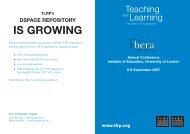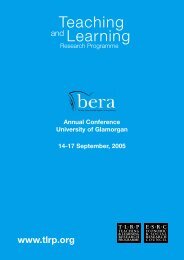Assessment in schools Fit for purpose? - Teaching and Learning ...
Assessment in schools Fit for purpose? - Teaching and Learning ...
Assessment in schools Fit for purpose? - Teaching and Learning ...
You also want an ePaper? Increase the reach of your titles
YUMPU automatically turns print PDFs into web optimized ePapers that Google loves.
<strong>Assessment</strong> <strong>in</strong> <strong>schools</strong>. <strong>Fit</strong> <strong>for</strong> <strong>purpose</strong>?<br />
Yet there is now a great volume of material catalogu<strong>in</strong>g the educational side-effects of a structure which is too<br />
focused on per<strong>for</strong>mance <strong>in</strong>dicators. These <strong>in</strong>clude the often excessive <strong>and</strong> <strong>in</strong>equitable focus of many <strong>schools</strong><br />
on pupils whose results may be key to a school hitt<strong>in</strong>g particular achievement targets; the repetition <strong>in</strong>volved <strong>in</strong><br />
months of focus<strong>in</strong>g on what is tested <strong>and</strong> on test practice, which also serves to narrow the curriculum; <strong>and</strong> the<br />
consequent underm<strong>in</strong><strong>in</strong>g of professional autonomy <strong>and</strong> morale among teachers.<br />
The impact on pupil motivation to learn is an area of particular <strong>in</strong>terest. If one of the central aims of assessment<br />
<strong>for</strong> learn<strong>in</strong>g is to encourage <strong>in</strong>dependent motivation to underst<strong>and</strong> among pupils, f<strong>in</strong>d<strong>in</strong>gs from research that<br />
learners <strong>in</strong> high-stakes test<strong>in</strong>g systems can become dependent on their teacher to guide them towards answers<br />
should be taken seriously.<br />
More generally on pupil motivation, the most extensive review of research <strong>in</strong> recent years 14 on the effect of the<br />
tests found that those that were seen as “high stakes” de-motivated many children. Only the highest atta<strong>in</strong>ers<br />
thrived on them, with many show<strong>in</strong>g high levels of anxiety. After the <strong>in</strong>troduction of national test<strong>in</strong>g <strong>in</strong> Engl<strong>and</strong>,<br />
the research found, self-esteem of young children became tied to achievement, whereas be<strong>for</strong>e there was little<br />
correlation between the two. This effect was found to <strong>in</strong>crease the gap between low- <strong>and</strong> high-achiev<strong>in</strong>g pupils,<br />
with repeated test practice tend<strong>in</strong>g to re<strong>in</strong><strong>for</strong>ce the poor self-image of the less academic. The review also found<br />
that pupils tended to react by view<strong>in</strong>g learn<strong>in</strong>g as a means to an end – the pursu<strong>in</strong>g of high marks – rather than<br />
as an end <strong>in</strong> itself.<br />
On the other h<strong>and</strong>, it has been argued that some children <strong>and</strong> young people thrive <strong>in</strong> the face of stressful<br />
challenges <strong>and</strong> that external tests <strong>and</strong> exam<strong>in</strong>ations do motivate pupils to take what they are learn<strong>in</strong>g seriously.<br />
Indeed, the government <strong>in</strong> Engl<strong>and</strong> has suggested this recently 15 , when argu<strong>in</strong>g that the possible <strong>in</strong>troduction of<br />
new tests, which key stage 2 pupils could take up to twice a year, could <strong>in</strong>crease motivation. There is as yet little<br />
evidence <strong>for</strong> this claim, <strong>and</strong> it needs further research.<br />
Sources:<br />
<strong>Assessment</strong> Re<strong>for</strong>m Group (2002) Test<strong>in</strong>g, Motivation <strong>and</strong> Learn<strong>in</strong>g. Cambridge: University of Cambridge Faculty<br />
of Education.<br />
Black, P., Gardner, J. & Wiliam, D. (2008) Jo<strong>in</strong>t memor<strong>and</strong>um on reliability of assessments. Submitted to the<br />
House of Commons, Children, Schools <strong>and</strong> Families Committee: Test<strong>in</strong>g <strong>and</strong> <strong>Assessment</strong>. Third Report of<br />
Session 2007-2008. Volume II. HC169-II. Norwich: The Stationery Office. Ev 202-5.ISBN 978 0 215 52041 8<br />
(Discussed <strong>in</strong> Vol. I pp22-6).<br />
Harlen W., & Deak<strong>in</strong> Crick R. (2002) A systematic review of the impact of summative assessment <strong>and</strong> tests<br />
on students’ motivation <strong>for</strong> learn<strong>in</strong>g. In: Research Evidence <strong>in</strong> Education Library. London: EPPI-Centre, Social<br />
Science Research Unit, Institute of Education, University of London.<br />
Newton, P. (2008) Presentation to the Cambridge <strong>Assessment</strong> Forum <strong>for</strong> New Developments <strong>in</strong> Educational<br />
<strong>Assessment</strong>. Down<strong>in</strong>g College, Cambridge. 10 December.<br />
Qualifications <strong>and</strong> Curriculum Authority (2009) Research <strong>in</strong>to mark<strong>in</strong>g quality: studies to <strong>in</strong><strong>for</strong>m future work on<br />
national curriculum assessment. London: QCA.<br />
14 Harlen W., & Deak<strong>in</strong> Crick R. (2002) A sytematic review of the impact of summative assessment <strong>and</strong> tests on students’<br />
motivation <strong>for</strong> learn<strong>in</strong>g. In: Research Evidence <strong>in</strong> Education Library. London: EPPI-Centre, Social Science Research Unit,<br />
Institute of Education, University of London<br />
15 Department <strong>for</strong> Education <strong>and</strong> Skills, (2007) Mak<strong>in</strong>g Good Progress: How can we help every pupil to make<br />
good progress at school? London: DCSF.<br />
25

















